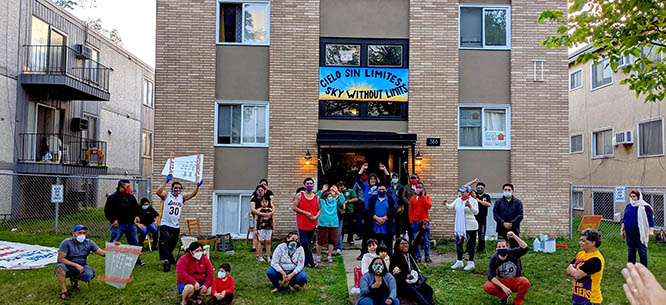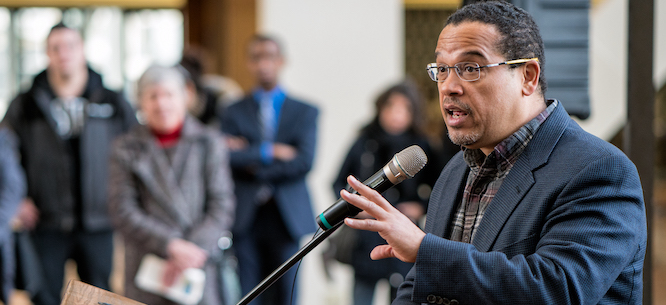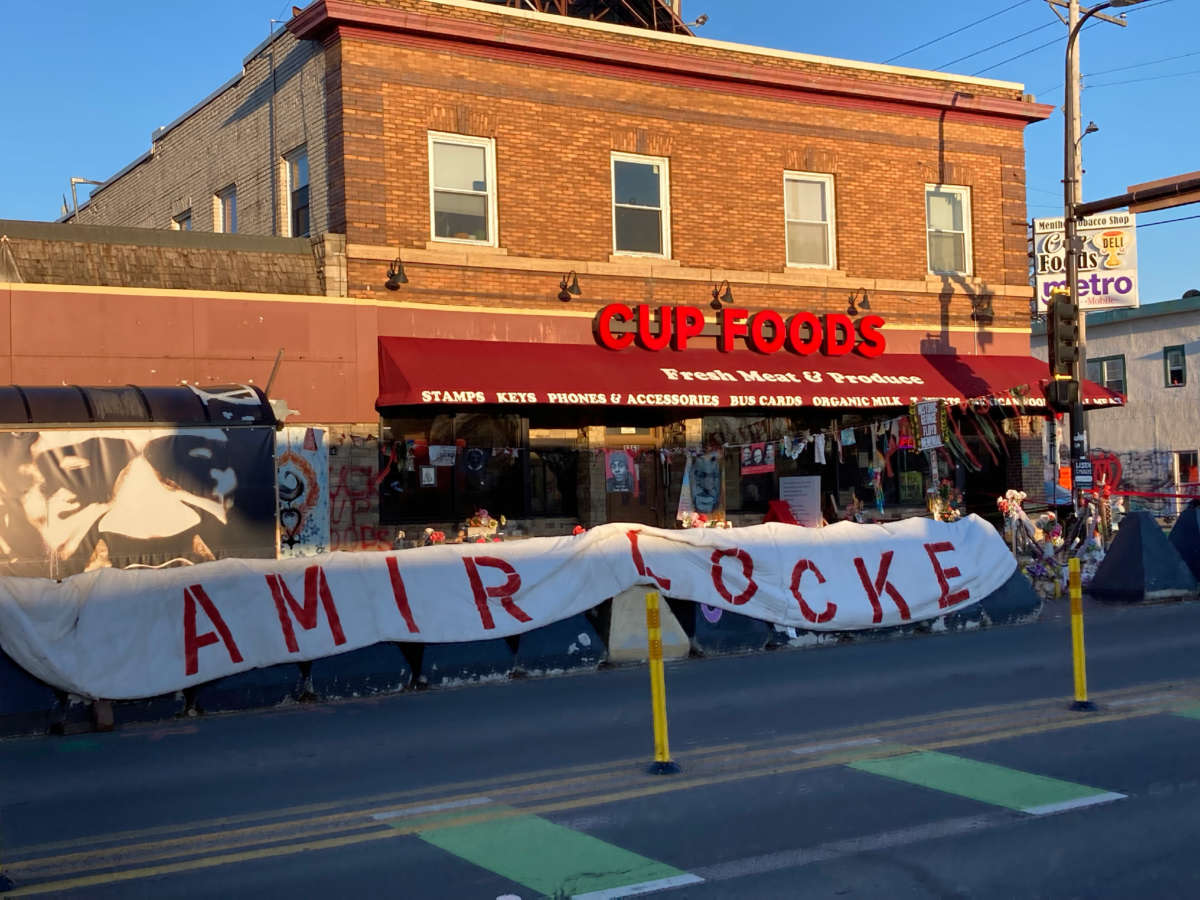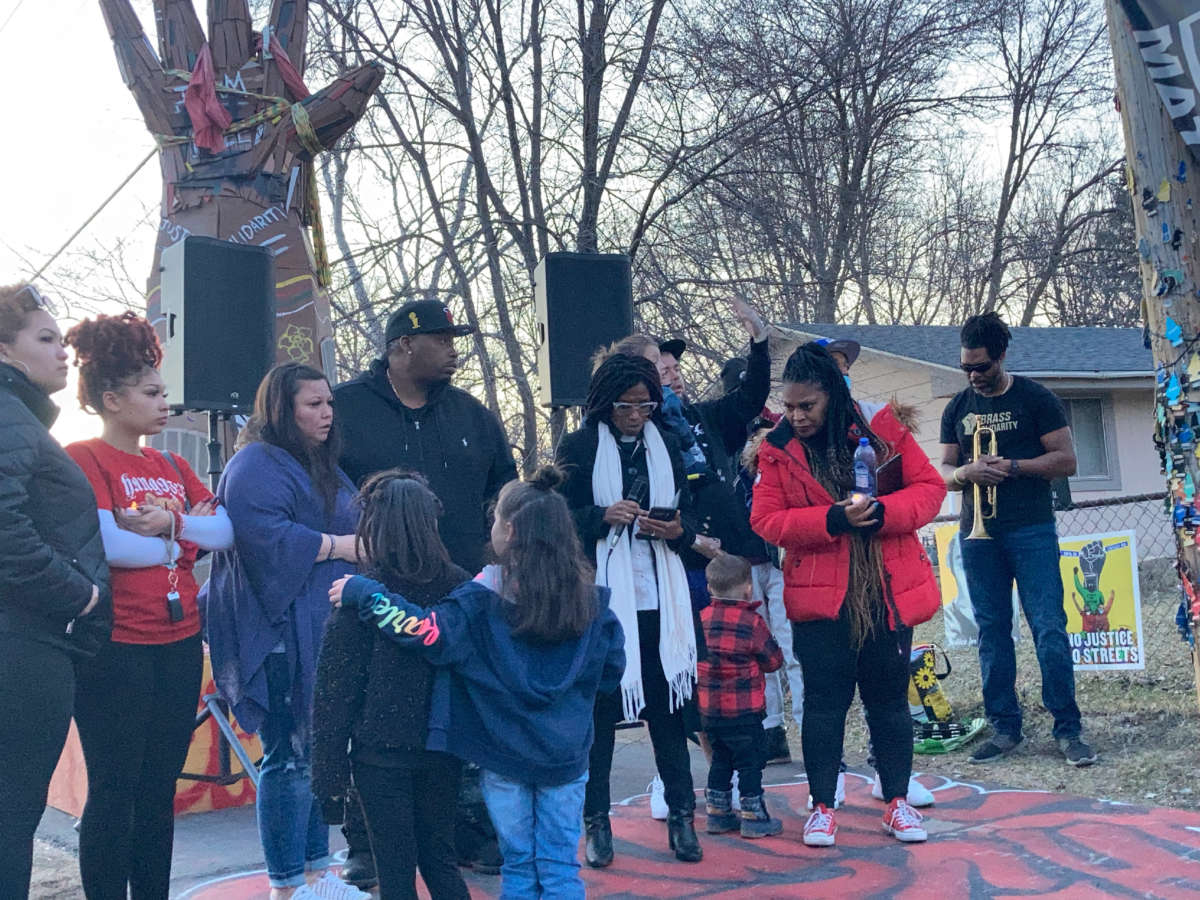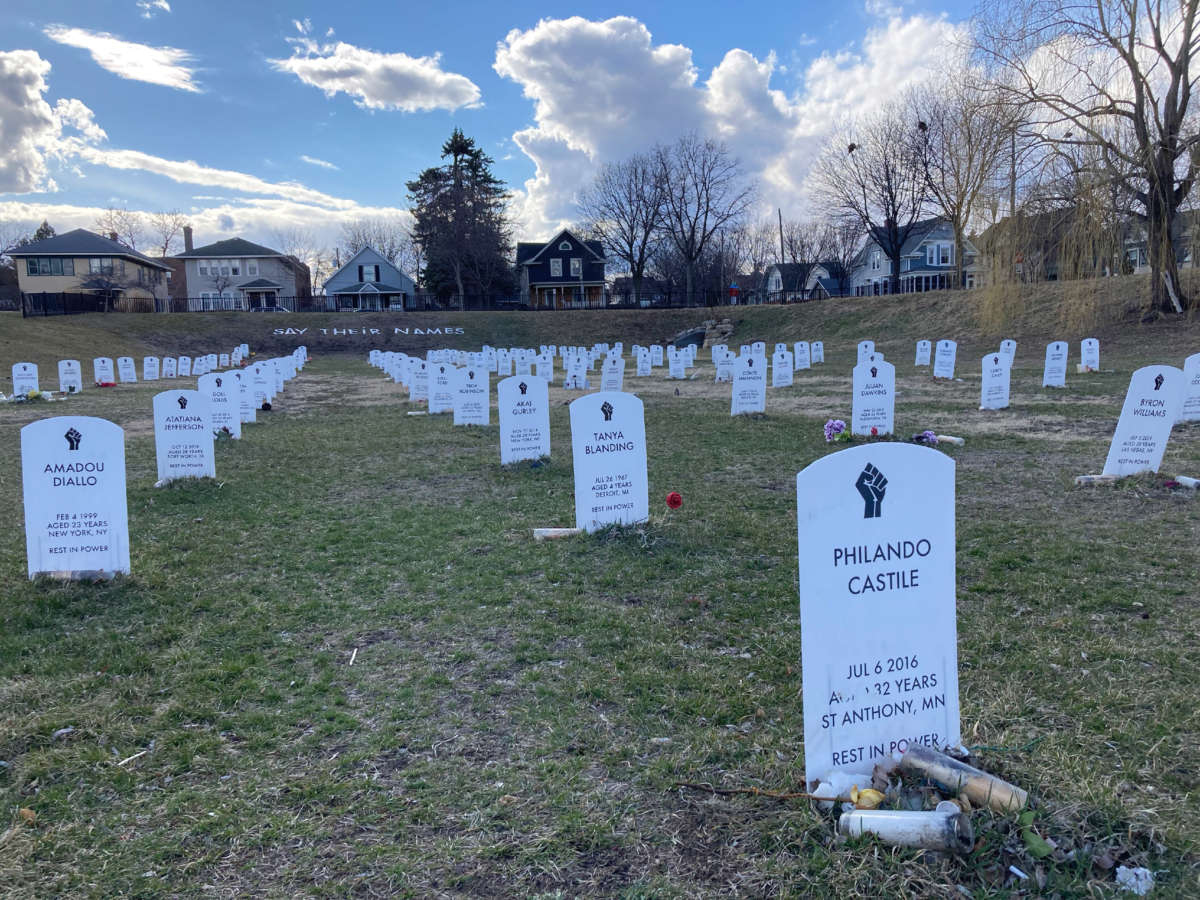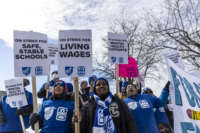Minneapolis, Minnesota – The Michels Corporation, headed by Trump-endorsed Wisconsin gubernatorial candidate Tim Michels, has contracts with the City of Minneapolis and an exclusive contract with CenterPoint Energy to service gas lines in Minneapolis, which raises concerns for residents.
In 2015, Minneapolis resident DeCourcy Squire shut off the gas to her Stevens Square condo, stopped paying the Houston based gas conglomerate, CenterPoint Energy (CPE), and began using alternative energy to power her home. She had been a tax resister ever since the Vietnam War, and after becoming involved with the grassroots group MN350 working to oppose the Line 3 Dakota Access Pipeline, she could not in good conscience contribute to the gas company any longer.
Squire told Unicorn Riot that she first learned about Michels Corporation while protesting Line 3, but didn’t realize they had an exclusive contract with CenterPoint Energy until recently.
“Pushing for corporate divestment is very important but I think personal divestment is also a small step towards an alternative future,” Squire said, not just referring to alternative energy but also alternative politics free of corporate influence.
The Michels Corporation, including its subsidiaries Michels Pipeline, Inc, Michels Power, Inc., Michels Construction, Inc., Michels Utility Services, Inc., Michels Trenchless, Inc., Michels Road and Stone, Inc., and Michels Pacific Energy, Inc., has become one of the largest utility contractors in North America. Many Twin Cities activists first became aware of them through the Dakota Access Pipeline (DAPL) construction, as reported by Unicorn Riot.
Michels currently has three offices in Minnesota, their newest being the Brooklyn Park office which opened in 2017, adding to its Lakeville and Rogers sites. According to Michels website, their goal is to expand service capabilities in the Midwest.
CenterPoint Energy’s website lists 27 active projects within Minneapolis alone, including Minnehaha, Hiawatha, Fulton, Kenwood, and Jordan neighborhoods, all using Michels Corporation.
As Transportation Funds Increase, So Do Michels’ Revenues
Michels Corp. and Michels Pipeline Construction have involvement in several special interest groups, especially three main lobby associations — Wisconsin Transportation Building Association, Transportation Development Association, and Construction Business Group, all with the primary aim to increase state transportation funds, allowing for more public contract money to flow directly to the Michels Corporation.
In the 2022 election cycle, individual employees and immediate family members of Michels Corporation have donated an accumulated $46,142 to campaigns, with the Republican National Convention (RNC) being the largest recipient of $20,000, according to the research group OpenSecrets, a national organization that tracks money in elections and its effects on public policy. This amount is far lower than the $134,905 the RNC received from Michels affiliates in the 2020 election cycle. Recent campaign donations to Republican congressional candidate Derrick Van Orden and U.S. Representative Glenn Grothman of Wisconsin has also been tracked to individuals from the Michels Corporation in the amounts of $17,399 and $4,650 respectively.
Wisconsin Right Now, a conservative news outlet, found that Michels’ involvement in special interest groups, with Michels executives serving in lieu of himself, has helped the company acquire nearly 1.2 billion dollars in contracts with the state of Wisconsin, implying public-private profiteering. The Minneapolis based news site Southwest Voices reported that Michels Corp. has $12.7 million in contracts with the City of Minneapolis since the start of 2020 alone.
While there is no official tie to Michels personally lobbying for increased gas taxes, higher registration fees, and blocking tax exemptions on gas and diesel fuel sold to school districts, it is clear that special interest groups Wisconsin Transportation Builders Association, which Michels served as Board President, and the Transportation Development Association, where Michels served on the executive board, have contributed financially to groups fighting to increase the gas tax.
Both the Democratic Party of Wisconsin and the Milwaukee Journal Sentinel reported that if Tim Michels wins the Wisconsin governorship, he said he will divest from the Michels Corporation, leaving his two brothers in charge. Regardless, if Michels becomes Wisconsin’s next governor, his family company and special interest groups will have one of their own at the helm of decisionmaking on government contracts and public utilities spending.
Michels admittedly said that he wants his family to continue seeking state-wide contracts, despite obvious political conflicts of interest. The company’s contracts in just the last five years from the state of Wisconsin exceed $660 million in payments.
Tim Michels’ Right-Wing Gubernatorial Campaign
In 2021, Michels announced his candidacy for governor of Wisconsin. But Wisconsin residents have challenged Michels’ residency, pointing to his East Coast homes where he lives much of the year, including his seventeen-million-dollar mansion in Connecticut and luxury penthouse on New York City’s Upper East Side.
In June 2022, former President Trump endorsed Michels, who has supported the “big lie” that Trump won the 2020 election and has suggested he will work to overturn the state’s 2020 election results if he wins in November. He vowed to abolish the bipartisan Wisconsin Elections Commission which administers and enforces state election laws. Additionally, Michels has doubled down in recent cultural wars committing to fight so-called ‘critical race theory’ (CRT) being taught in public schools, abortion and more.
Michels has been outspoken about his anti-abortion stance and says he’d ban abortion and emergency contraceptives if elected Wisconsin governor. “I believe God is unhappy with the country that allows for the killing of babies,” he said at an event in Calumet County, WI.
Polls throughout 2022 consistently had former Lt. Gov. Rebecca Kleefisch ahead as the favorite in the Wisconsin Republican gubernatorial primary by a comfortable margin. Kleefisch is supported by her former boss, the past GOP rising star, former Wisconsin Governor Scott Walker. However, Michels won the Republican primary on August 9, the day after the FBI raided Mar-a-Lago, with 47% of the vote, beating Kleefisch by five points.
Residents React to the Minneapolis–Michels Connection
Residents in Minnesota and Wisconsin are concerned about Michels Corp.’s ongoing government contracts and its exclusive partnership with CenterPoint Energy, which holds a monopoly on natural gas in the Twin Cities. These concerns are becoming intensified now as they become aware of their unwitting contribution to Michels’ campaign.
“I wonder if I’m paying for this unnecessary MPD protection & supporting Tim Michels for governor through my CenterPoint bill or directly to MPD with my property taxes?” Nikki Carlson, who uses the handle @M_Nikki_dUrso, tweeted.
Carlson, who is a North Minneapolis resident, took to Twitter on July 13 to share her encounter with a Michels worker. She observed what she believed was an ineffective use of Minneapolis law enforcement.
“I asked the Michels guy why there are so many police squads there. He said to guard their employees while working in ‘the ghetto.’”
North Minneapolis is the historic Black section of the city that has been over-policed and under-resourced for generations, activists say.
The Michels’ worker told Carlson that police protection was a condition of their contract. However, Michels has been seen working in other parts of the city by residents without police protection.
One person tweeted that Michels’ staff vehicles have far-right bumper stickers on them that make residents feel “very uneasy.”
Minneapolis residents have also raised concerns about Michels’ hiring practices and worry that the company apparently doesn’t hire Black people. “WHY is this co. laying pipe in N. Mpls & putting their workers from Wright County in hotels when we have qualified people right here?” Carlson tweeted.
Minneapolis City Council President Andrea Jenkins has expressed these same concerns in emails. “I share many of the concerns you’ve identified and have brought these issues up with CenterPoint Energy many times…While it is true that our utilities payments support the Michels company, no taxpayer dollars support this, in fact the utility companies have to pay for permits to the city to do the work.”
However, Michels Corp. has several contracts with the city’s Public Works Department paid by Minneapolis taxpayers, which was reported last month by Southwest Voices.
Although Minneapolis police (MPD) are providing security for Michels while they do work in North Minneapolis, cops are being privately paid through its contract with CPE, Council Member Jenkins said.
MPD is allowed to wear their city uniforms and drive taxpayer-funded squad cars while working off-duty security jobs for private companies.
However, Fox 9 recently found MPD protecting Target and Michels construction crews during their regular shift. “During those day shifts, Fox 9 cameras found officers stationed around retail stores and construction sites.”
Carlson tweeted that a drunk cop working security for Michels aggressively confronted her and implied that they are indeed being paid by taxpayers. “Angry intoxicated MPD officer just told me it isn’t about preserving police resources to focus on violent crime, it’s about OVERTIME pay for light duty & I need to STFU. (& everyone but me knows this).” She reacted, “I was naive thinking the objective was public safety.”
MPD is said to inform contractors in construction when and if they need protection, according to a source.
Jenkins added, “To be clear, I find the response of the Michels employee to the Northside resident’s question to be despicable, Michels needs to create a more diverse workforce that reflects the communities they serve.” However, the city council president made no commitment to take any action.
One resident who uses the handle @JenAntila tweeted that when their sewer line failed over a decade ago, a city public works employee gave them a list of city approved sewer line contractors and said, “‘I can’t recommend anyone but my pen slipped,’ Michels was circled. I hired them.”
@JenAntila told Unicorn Riot that it was mid January when her sewer line failed and that Michels did a good job repairing it. But she also regrets her decision after discovering the politics of the company. “I just hate knowing what an a-hole [Tim] Michels is and knowing how much the city and & constituents (like me) bankroll him and have for decades.”
“These are the same a$$holes that last summer were tearing up forests, wet lands & waters in Northern MN to put in another Enbridge pipeline,” tweeted another.
Residents noted the irony of Minneapolis cops calling the city dangerous while the same officers are being used to protect private companies rather than protecting the public.
“These police officers care more about protecting out-of-towners from imaginary danger than protecting their own citizens from real danger,” one user tweeted.
Also, residents claim that police have intentionally made the city more dangerous by slowing down their work and threatening not to exit their squad cars while patrolling.
“And they say they don’t have staff to patrol/have a constant presence in Dinkytown at night,” tweeted another.
* * *
As Trump-endorsed Republican, Tim Michels solidifies his conservative ideologies in Wisconsin’s gubernatorial race, it remains unclear to Minneapolis residents just how much they are funding his right-wing campaign steeped in anti-democracy rhetoric, simply by paying taxes and their monthly gas bill.
“Minnesota’s energy dollars are supporting a candidate for governor of Wisconsin that wants to ban all abortions with no exceptions for rape and incest. He opposes same-sex marriage and all LGBQT rights. Is that what we want? I know I don’t,” Carlson told Unicorn Riot.
While the exact dollar amount coming from Minneapolis residents into Michels’ campaign cannot be estimated, it is apparent that Tim Michels is profiteering from his company’s contracts with the City of Minneapolis Public Works Department and its exclusive contract with CenterPoint Energy, helping fund his race — with Michels being the largest donor to his campaign at $11,940,882.25 of the $12 million raised.
Nathaniel Guthrie, who goes by the Twitter handle @WoodGhuthriempls, suggested boycotting CPE. “Imagine that, Centerpoint energy supports racists. We can’t be shocked that the cops do, but this open cowardice and racism from Michels corporation should be stressed to center point.” Adding, “Be a shame if we all here in ‘the ghetto’ stopped paying them en masse.”
Unicorn Riot called and emailed several people at CenterPoint Energy for this story. When we asked CenterPoint Energy’s Director of Communications in Minneapolis, Hannah Gullickson, if CPE will respond to the numerous residents who object to funding Michels’ right-wing campaign through their gas bills, she said she doesn’t speak to the press and forwarded the message to Ross Corson, Senior Communications Specialist. We have not received an immediate response from Corson
This post was originally published on Latest – Truthout.
